Malin Surname Ancestry ResultsOur indexes 1000-1999 include entries for the spelling 'malin'. In the period you have requested, we have the following 153 records (displaying 1 to 10): Single Surname Subscription | | | Buying all 153 results of this search individually would cost £852.00. But you can have free access to all 153 records for a year, to view, to save and print, for £100. Save £752.00. More... |
These sample scans are from the original record. You will get scans of the full pages or articles where the surname you searched for has been found. Your web browser may prevent the sample windows from opening; in this case please change your browser settings to allow pop-up windows from this site. Inhabitants of Yorkshire
(1297)
Taxation roll of the lay (non-clergy) inhabitants of Yorkshire from the 25th year of the reign of king Edward I. LatinMALIN. Cost: £6.00.  | Sample scan, click to enlarge
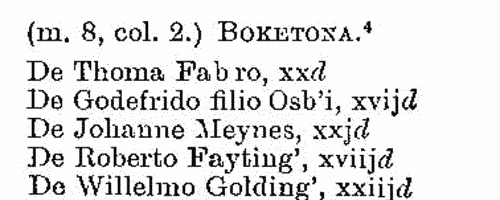
| Derbyshire Householders
(1327)
Tax return on goods and land held by all lay persons (i. e., non-clergy) in Derbyshire
MALIN. Cost: £6.00.  | Sample scan, click to enlarge
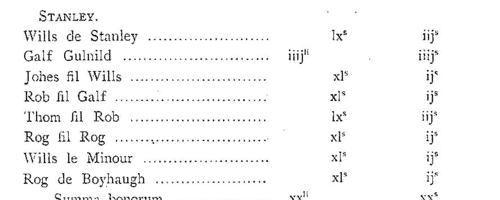
| Inhabitants of Leicester
(1327-1509)
The Corporation of Leicester commissioned the publication (in 1901) of extracts from the borough archives of 1327 to 1509, edited by Mary Bateson. This volume brings together several important sources: a coroner's roll of 1327; the merchant gild rolls; tax returns; court rolls; rentals; mayoral accounts, &c. All the Latin and French texts are accompanied by English translations. Not all the tax rolls surviving for this period are printed: but full lists of names are given for tallages of 1336 (pp. 34-40); 1347-8 (69-71); and 1354 (93-99); subsidy rolls of 1492 (331-334) and 1497 (351-353); and a benevolence roll of 1505 (370-374). There is a calendar of conveyances (388-446), and a list of mayors, bailiffs, and other officials (447-462); and, finally, entrants into the merchant gild
from 1465 to 1510. Membership of the merchant gild was by right of inheritance (s. p. = sede patris, in his father's seat), or by payment of a fee called a 'bull' (taurus). Those marked * paid their bull, and were thus, by implication, not natives, or at least not belonging to gild merchant families. By 1400 membership of the gild merchant had become the equivalent of gaining freedom of the borough (being a free burgess): but thitherto the two were not necessarily the same, and some of the merchant gild members were not resident in the borough, merely traded there.MALIN. Cost: £4.00.  | Sample scan, click to enlarge

| London Marriage Allegations
(1521-1610)
London, Essex and part of Hertfordshire lay within the diocese of London. In the later 17th century the individual archdeaconry courts issued marriage licences, but for this period the only surviving material is from the overarching London Consistory court. The main series of marriage allegations from the consistory court starts 7 December 1597, and these were extracted by Colonel Joseph Lemuel Chester; Colonel Chester then discovered earlier material, back to 5 January 1521, in Vicar-General's Books of the Principal Probate Registry. The notices in these books were much briefer, but as well as extending back so much earlier, they included additional material for 1597 onwards. All this he collated with the consistory court extracts, and the text was edited by George J. Armytage and published by the Harleian Society in 1887. A typical later entry will give date; name, address and occupation of groom; name, address and condition of his intended bride, and/or, where she is a spinster, her father's name, address and occupation. Lastly we have the name of the church where the wedding was going to take place; or the words Gen. Lic. signifying a general or open licence.MALIN. Cost: £4.00.  | Sample scan, click to enlarge

| PCC Probates and Administrations
(1633)
The Prerogative Court of Canterbury's main jurisdiction was central and southern England and Wales, as well as over sailors &c dying abroad: these brief abstracts, compiled under the title "Year Books of Probates", and printed in 1902, usually give address, date of probate and name of executor or administrator. They are based on the Probate Act Books, cross-checked with the original wills, from which additional details are, occasionally, added. The original spelling of surnames was retained, but christian and place names have been modernised where necessary.MALIN. Cost: £2.00.  | Sample scan, click to enlarge
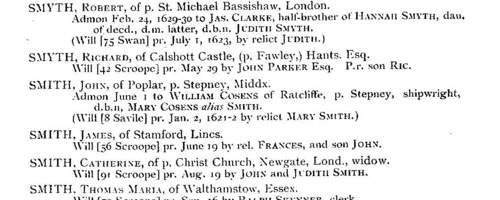
| Inhabitants of Cambridge
(1504-1635)
Cambridge comprised fourteen ancient parishes, plus the university (which was extra-parochial), in the diocese of Ely. The church of St Mary the Great (as opposed to St Mary the Less) in the Market Place (juxta forum) has churchwardens' accounts surviving from 1504 onwards. Those from 1504 to 1635 were transcribed by J. E. Foster for the Cambridge Antiquarian Society and published in 1905. The two churchwardens were chosen annually: the previous year's churchwardens each chose another parishioner: those two then each chose three other parishioners: the resulting eight then chose the new year's churchwardens, the wardens of the Light of the Rood, and the wardens of the Mass of Jesus. Auditors were also chosen, usually out of the eight, to examine all the wardens' accounts at the end of the year. The churchwardens' accounts are largely concerned with the costs of repair of the church and its furnishings, and include the names of tradesmen and workmen. Each Easter a rate called Easter money was raised was raised from all householders in the parish, and additional rates are occasionally levied for unusual expenses, such as steeple reconstruction. These 'Easter book' lists give a complete list of householders for the parish, excepting the poor. The church's income also included the rents from some houses in the parish, and the names of the tenants appear. The offices of the Light of the Rood and the Mass of Jesus were abolished during the Reformation. The accounts of the Light of the Rood, i. e., for candles burnt before the crucifix, often include a list of sums received for funerary diriges (dirges) for the year, from which the year of death of the more prosperous parishioners can be traced in this early period. MALIN. Cost: £4.00.  | Sample scan, click to enlarge

| Official Papers
(1651)
The State Papers Domestic cover all manner of business relating to Britain, Ireland and the colonies, conducted by the Council of State, as well as other miscellaneous records. These records are from January to October 1651.
MALIN. Cost: £4.00.  | Sample scan, click to enlarge

| PCC Probate Abstracts
(1652-1653)
The Prerogative Court of Canterbury's main jurisdiction was central and southern England and Wales, as well as over sailors &c dying abroad: these brief abstracts usually give address, date of probate and name of executor or administrator
MALIN. Cost: £2.00.  | Sample scan, click to enlarge

| Prerogative Court of Canterbury Wills: London and Middlesex: Testators
(1658)
William Brigg compiled abstracts of all the wills in Register "Wootton" of the Prerogative Court of Canterbury. The abstracts of those proved in 1658 were published by him in 1894. The court's main jurisdiction was central and southern England and Wales, as well as over sailors &c dying abroad. We have re-indexed the whole volume, county by county, for both testators and strays (legatees, witnesses and other persons mentioned in the abstracts). MALIN. Cost: £4.00.  | Sample scan, click to enlarge
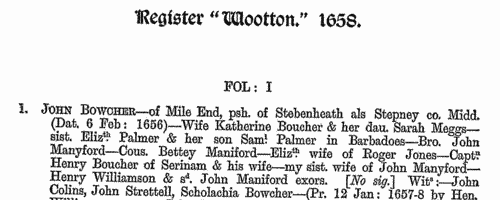
| Colonists and adventurers
(1610-1660)
During this period, the English crown issued charters to companies of adventurers and individual proprietors to establish settlements in Acadia (Nova Scotia), Africa, Amazon, Anguilla, Antigua, Association (Tortuga), Bahamas, Barbadoes, Barbuda, Bermudas (Somers Islands), Canada, Cape Gratia de Dios, Carolina, Bay of Darien, Delaware Bay, Deseada, Dominica, Eleuthera, Enegada, Fernando de Noronho, Floria, Fonseca, Grenada, Guadaloupe, Guiana, Guinea, Henrietta, Jamaica, Long Island, Maine, Marigalante, Maryland, Metalina, Montserrat, Narrangansetts Bay, Nevis, New England (New Plymouth, Massachusetts, Connecticut and New Haven), Newfoundland, New Hampshire, New York, Nova Scotia, Providence Island, Quebec, Redendo, Rhode Island, St Bartholomew, St Brandon, St Christopher's, St Eustache, St Lucia, St Martin, St Vincent, Sembrera, Surinam, Tadousac, Tobago, Todosantes, Trinidad and Virginia. The central archive relating to these ventures up to 1688 amounted to 71 volumes of correspondence, plus 109 entry books containing entries of letters sent to the colonies, of charters, commissions and instructions, minutes and proceedings of the companies and proprietaries that in the first instance governed several of the colonies, journals of the Board of Trade, &c. This archive, called the State Papers, Colonial Series, at the Public Record Office, was calendared for the period through to 1660 by W. Noel Sainsbury, and published in 1860. The first few pages include material as early as 1574, but the bulk of the volume is from 1610 to 1660, and that is indexed here.MALIN. Cost: £4.00.  | Sample scan, click to enlarge
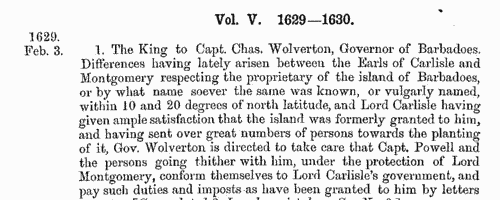
|
Research your ancestry, family history, genealogy and one-name study by direct access to original records and archives indexed by surname.
|












